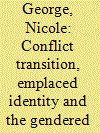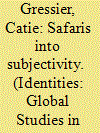| Srl | Item |
| 1 |
ID:
175364


|
|
|
|
|
| Summary/Abstract |
Although there is growing recognition that women’s participation is critical for the durability of peaceful conflict transition, grounded research examining the political scale of women’s participation has not been common. Where feminist researchers have tackled this topic, they have generally reproduced binary representations of political space, sometimes strongly critical of local spaces as restrictive of women, sometimes strongly critical of a hegemonic liberal international. In this article, I address the issue of women’s participation in conflict transition governance from another more ethnographic angle, drawing from fieldwork conducted in the Solomon Islands, a Pacific Islands country destabilised by conflict in the late 1990s and early 2000s. I apply theories of political scale to consider where and how women are politically active in the conflict transition environment, how that political activity is constituted relative to other political scales and where and how women seek to make their political ambitions understood. The ‘emplacement’ lens I develop offers a critical vantage point for analysis of the ways women constitute political identities and the agendas they might meaningfully progress, at scales ranging from the small worlds of the household and the community to the broader scale of national politics.
|
|
|
|
|
|
|
|
|
|
|
|
|
|
|
|
| 2 |
ID:
143640


|
|
|
|
|
| Summary/Abstract |
This article contributes to the discussion of the everyday sociabilities that arise between migrant newcomers and local urban residents. We highlight the proximal, workplace and institutionally based social relations that newcomers and locals construct through finding domains of commonality, noting that in such instances differences are not constituting factors for the development of urban sociabilities. The urban sociabilities we describe emerge within the contingencies of a disempowered city in which all residents face limited institutional support and social or economic opportunities. Concepts of multiscalar displacements and emplacements are highlighted as useful for setting aside a communitarian bias in urban and migration studies and analysing urban sociabilities in ways that situate migrants within discussions of urban social movements.
|
|
|
|
|
|
|
|
|
|
|
|
|
|
|
|
| 3 |
ID:
113887


|
|
|
|
|
| Publication |
2011.
|
| Summary/Abstract |
The elite safari lodges in Botswana's Okavango Delta provide an intriguing site through which to explore processes of identity construction, as people from vastly different backgrounds meet and explore ontological possibilities through and against each other. Drawing on a dinner table dispute between an African American tourist and his white Motswana guide, I explore contested notions of what constitutes African identities. The encounter shows that colonial histories and the racialization of space continue to be central to African identity politics, and I describe how white citizens' claims to belonging are challenged on these grounds. In response to such challenges, white Batswana assert a strongly nationalistic identity, distancing themselves from other southern African white populations and their colonial histories. They staunchly defend their claims to belonging through mobilising a partial view of Botswana's history and contemporary sociopolitical conditions, which has made possible a deep sense of emplacement within the social and natural environments of the Okavango.
|
|
|
|
|
|
|
|
|
|
|
|
|
|
|
|